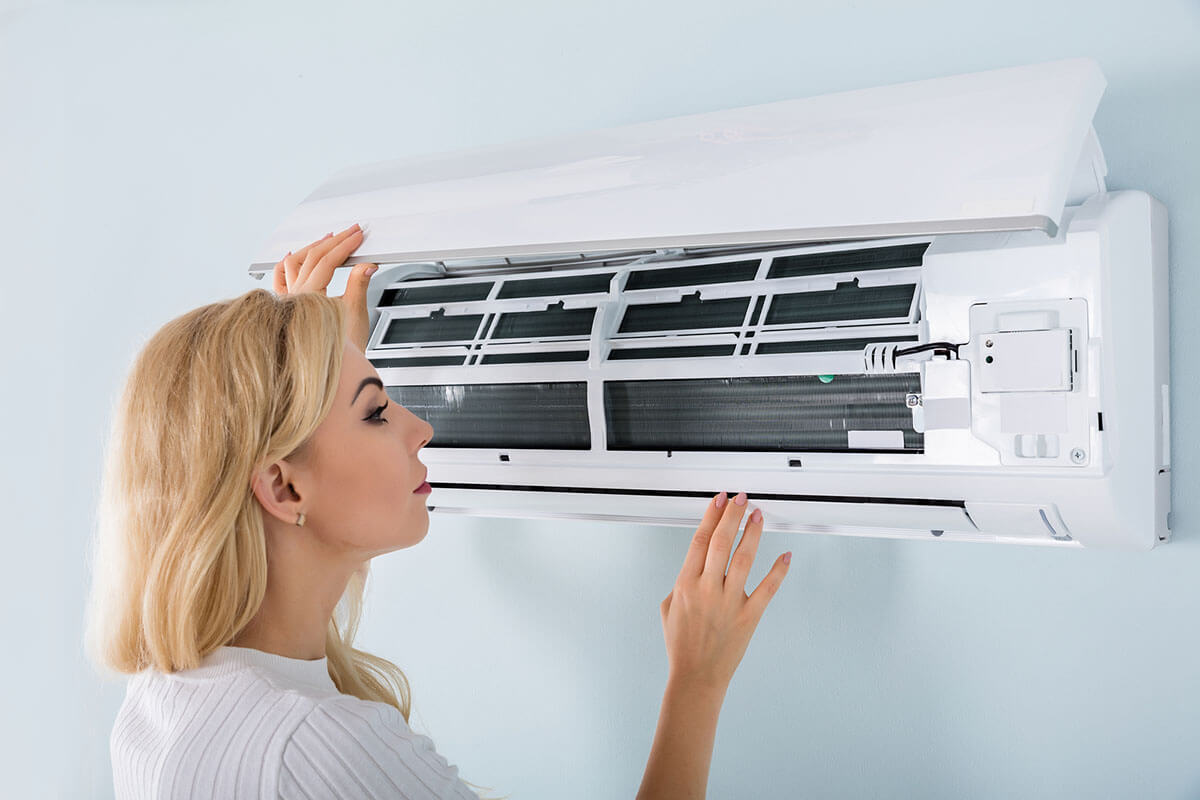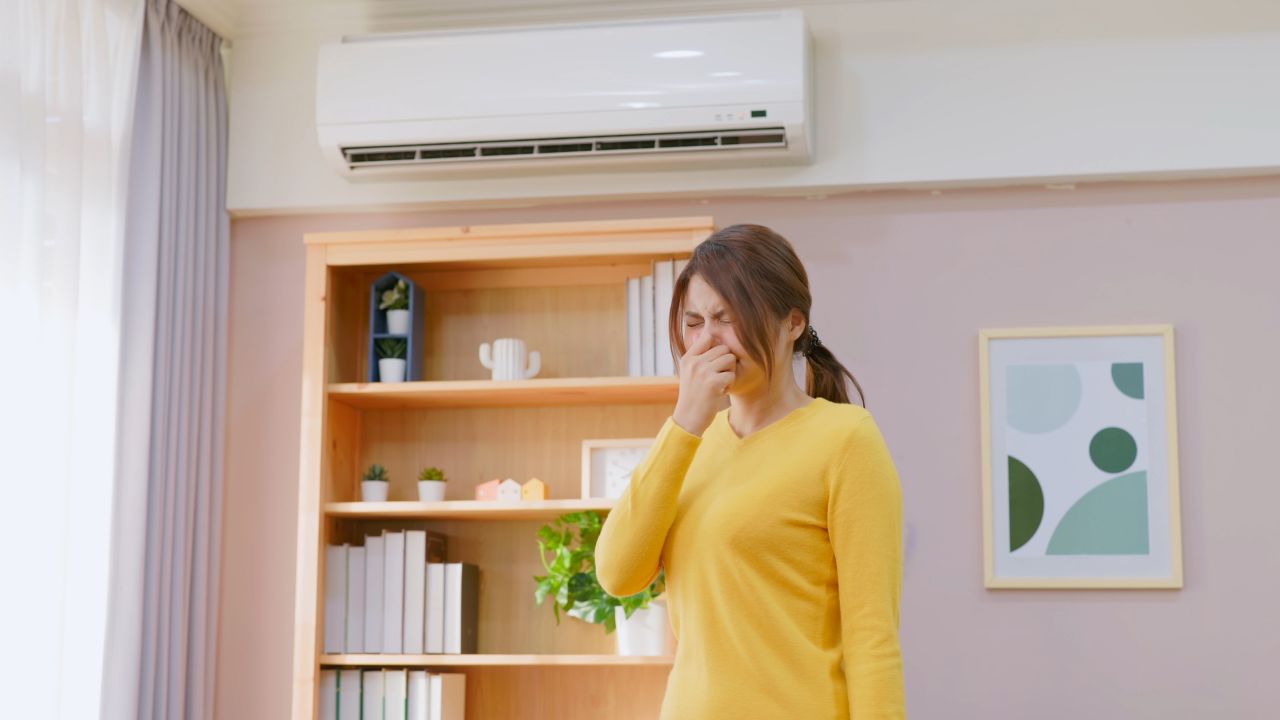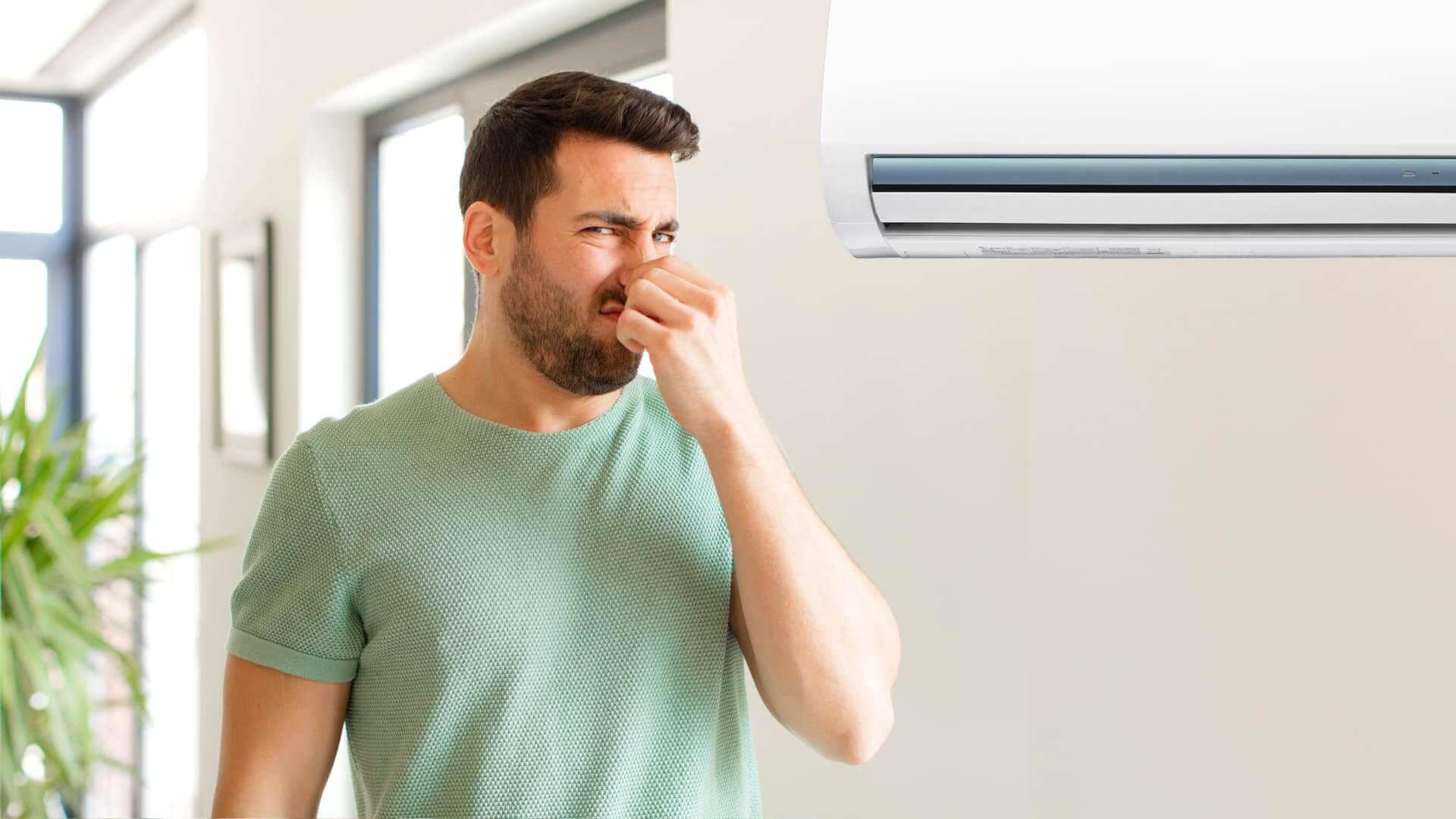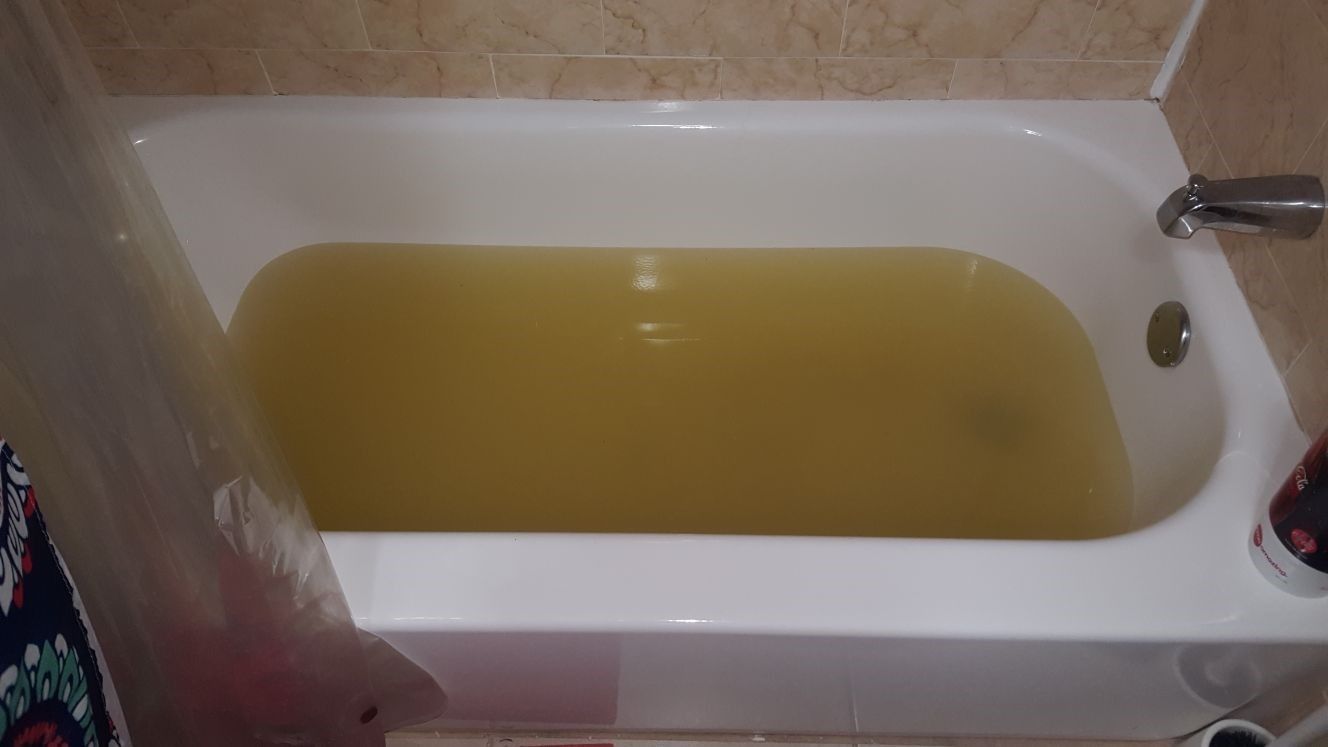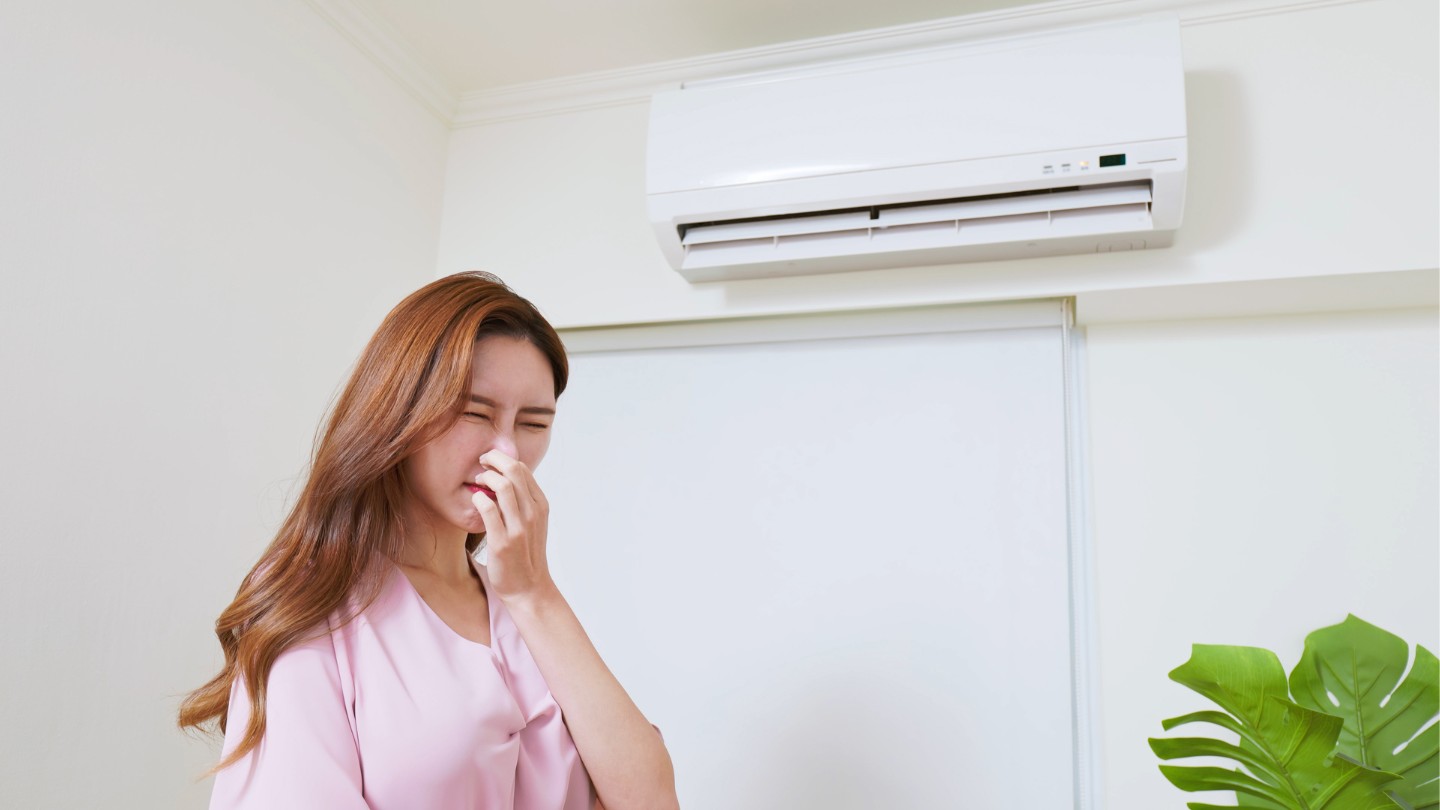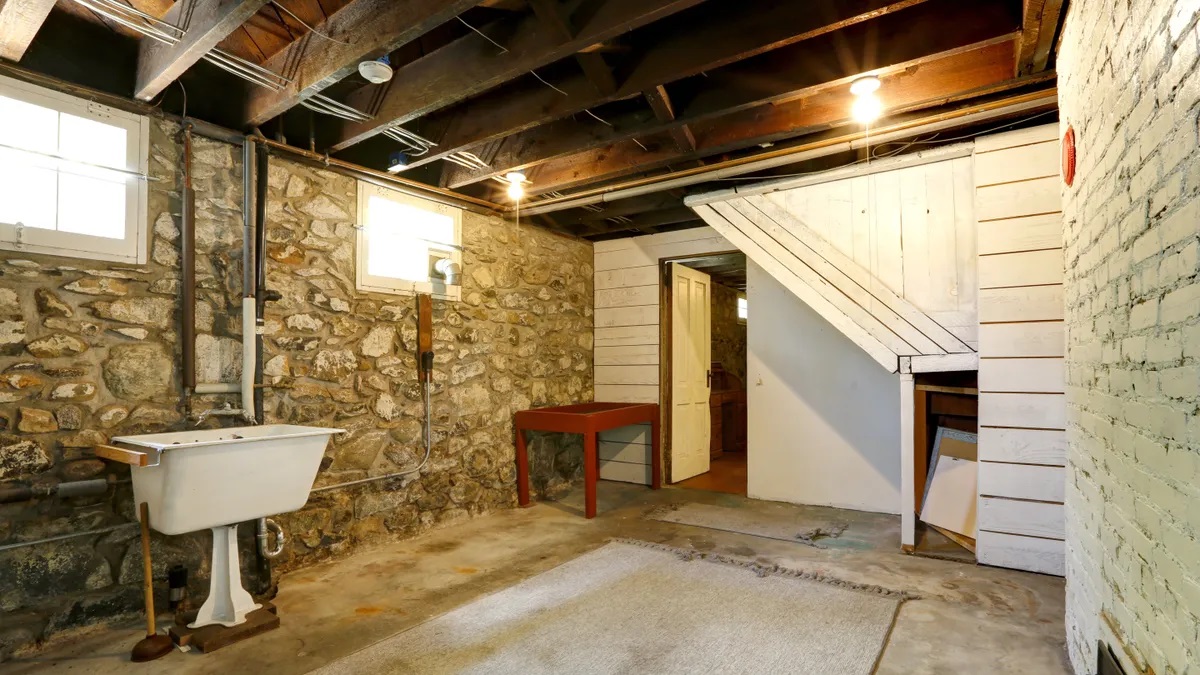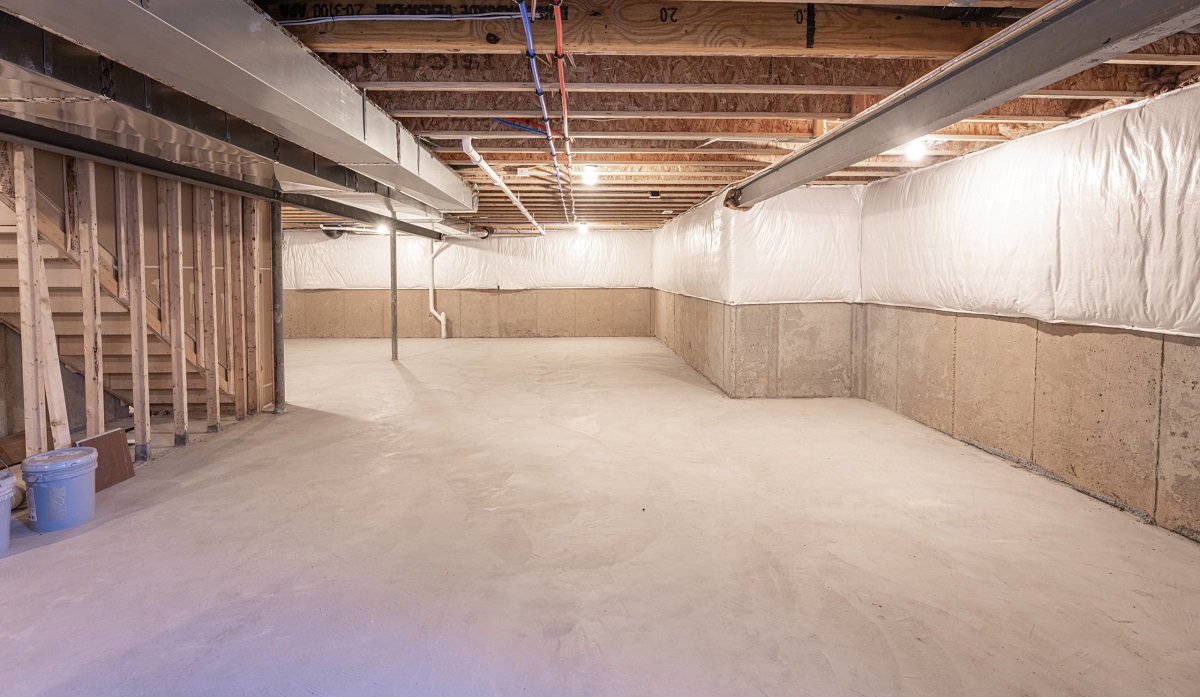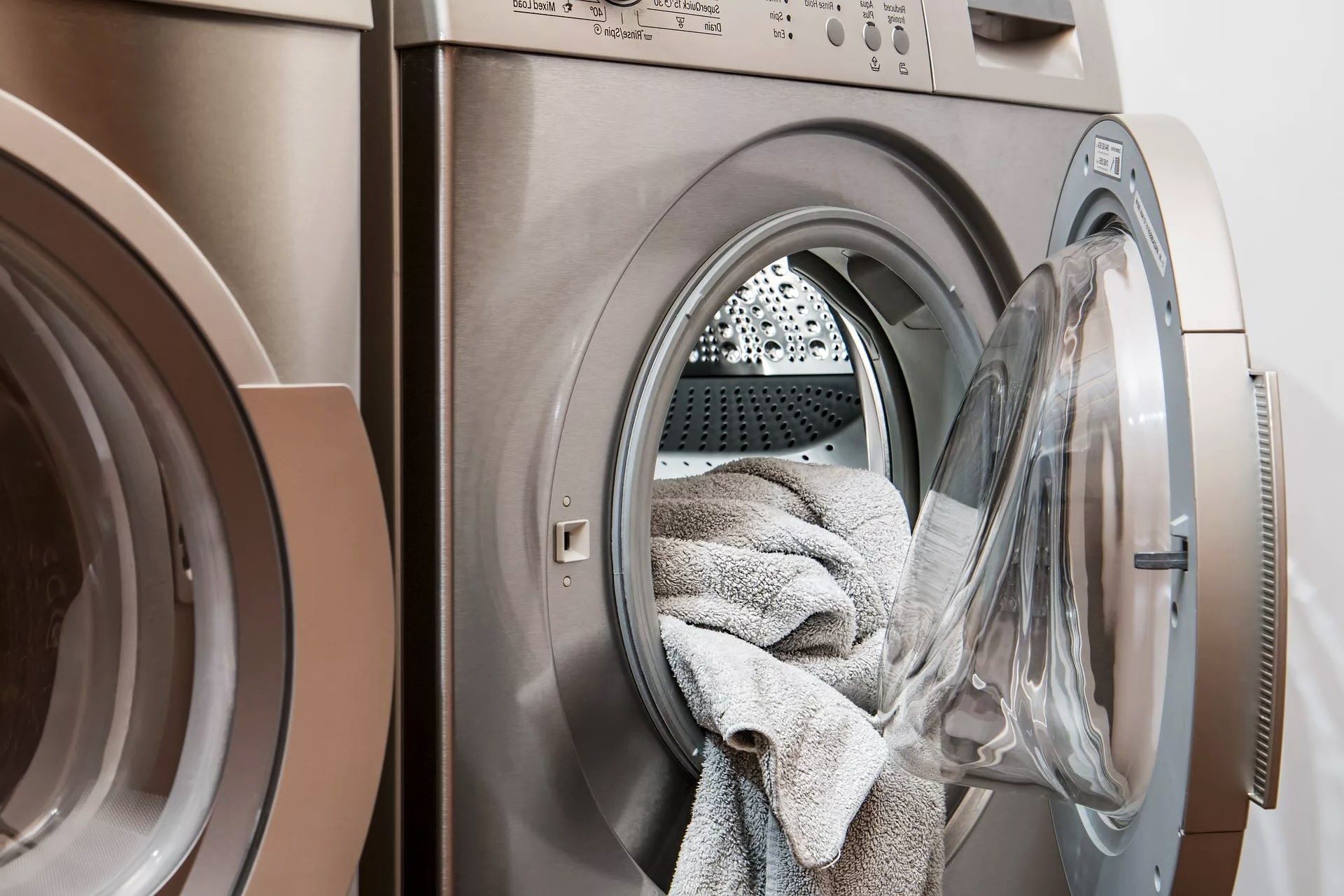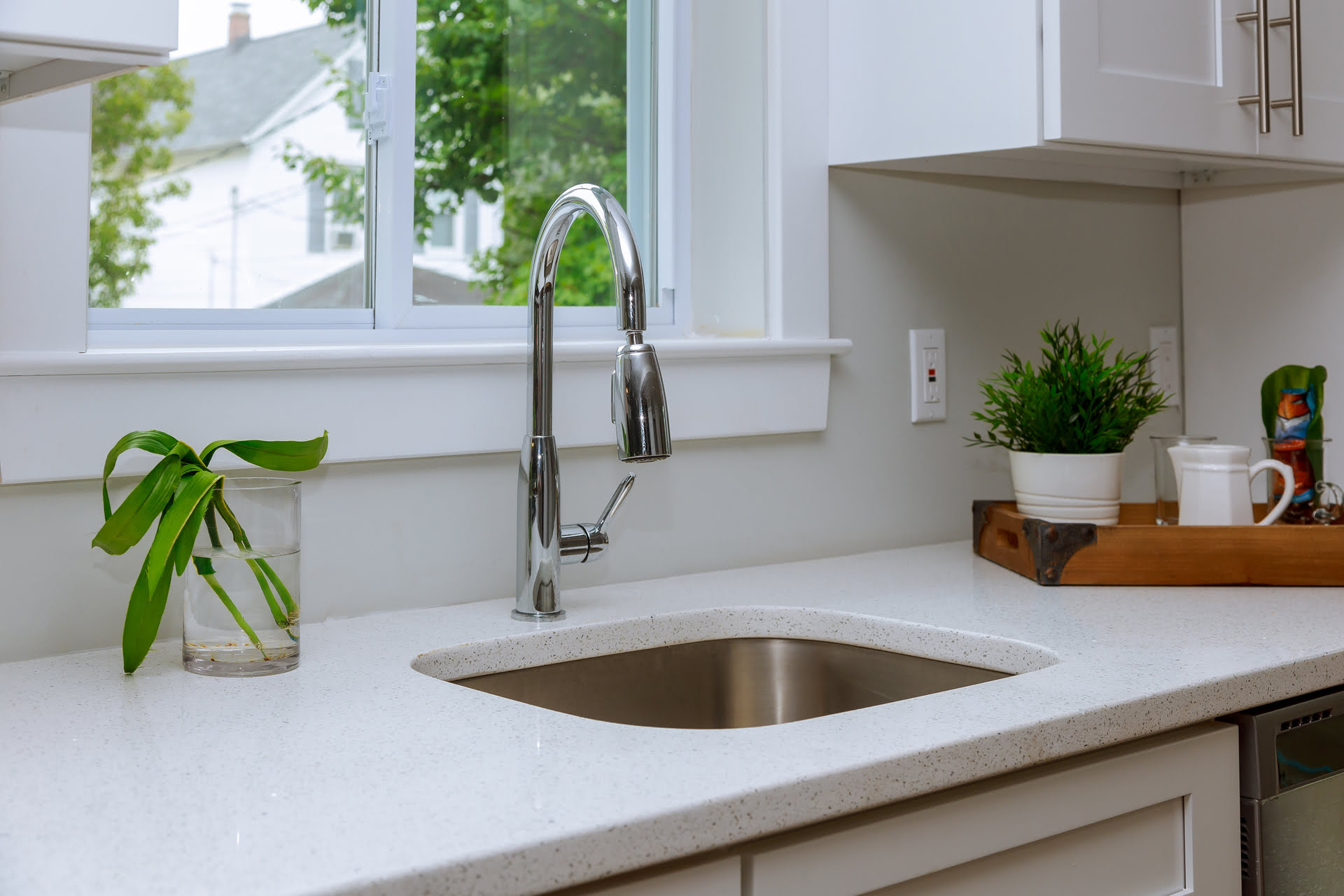Home>Home Maintenance>Why Does My Air Conditioner Smell Like Burning


Home Maintenance
Why Does My Air Conditioner Smell Like Burning
Modified: October 28, 2024
If your air conditioner emits a burning smell, it could signal a potential issue with your home maintenance. Learn why this happens and what you can do to address it.
(Many of the links in this article redirect to a specific reviewed product. Your purchase of these products through affiliate links helps to generate commission for Storables.com, at no extra cost. Learn more)
Introduction
A burning smell coming from your air conditioner can be a cause for concern. Not only can it be unpleasant, but it may also indicate a potential problem with your cooling system. Understanding the common causes of a burning smell from an air conditioner and knowing how to address them can help you ensure the safety and functionality of your unit.
It’s important to note that if you notice a burning odor coming from your air conditioner, it is generally not something you should ignore. While some causes can be relatively harmless, others can pose a fire risk or indicate a major malfunction in the system. Therefore, it is essential to identify and address the source of the smell promptly.
In this article, we will explore the common causes of a burning smell from an air conditioner and provide effective solutions to address them. We will also highlight the importance of regular maintenance and cleaning to prevent these issues from occurring in the first place.
Key Takeaways:
- Regular maintenance and cleaning are crucial to prevent a burning smell from your air conditioner. Professional help should be sought immediately to ensure safety and proper functioning of the system.
- Addressing issues such as clogged filters, electrical problems, and mold growth can eliminate the burning smell. Turn off the system and seek professional help to ensure safety and efficient operation.
Common Causes of Burning Smell from Air Conditioner
If you notice a burning smell emanating from your air conditioner, it’s essential to understand the potential causes. Here are some of the most common reasons why your air conditioner might emit a burning odor:
- Overheating Motor: An overheating motor can produce a burning smell. This can occur due to a lack of lubrication, worn-out bearings, or excessive strain on the motor. If the motor is overheating, it’s crucial to address the issue promptly to prevent further damage to the air conditioner.
- Electrical Issues: Faulty or damaged electrical components can lead to a burning smell. Issues such as frayed wiring, loose connections, or electrical shorts can cause wires to heat up and emit a burnt odor. It is important to have a professional electrician diagnose and repair any electrical problems.
- Clogged Air Filters: When air filters become clogged with dust, dirt, and debris, it can restrict the airflow and cause the air conditioner to work harder. As a result, the motor can overheat, leading to a burning smell. Regularly cleaning or replacing the air filters can help prevent this issue.
- Accumulated Dust and Debris: Over time, dust, dirt, and debris can accumulate on the internal components of the air conditioning system. When these particles come into contact with hot surfaces, they can burn and create a foul odor. Regular cleaning and maintenance can help prevent the buildup of dust and debris.
- Mold or Mildew Growth: Moisture is a common breeding ground for mold and mildew. If there is excessive moisture in your air conditioner, it can promote the growth of these microorganisms. When the mold or mildew comes into contact with hot surfaces, it can produce a burning odor. Proper cleaning and dehumidification can help prevent mold and mildew growth.
- Chemical Contaminants: Sometimes, chemicals such as cleaning agents or pesticides can accidentally enter the air conditioning system. When these chemicals are exposed to heat, they can emit a burning smell. It’s important to avoid introducing any foreign substances into the system and ensure proper ventilation during chemical applications.
- Burning or Melting Wiring: In some cases, wires within the air conditioning system can become damaged or deteriorated over time. This can result in burning or melting of the wires, leading to a distinct odor. If you suspect wiring issues, it’s vital to seek professional help to prevent electrical hazards.
- Foreign Objects in the System: Occasionally, small objects or debris can find their way into the air conditioner, causing a burning smell when they come into contact with hot components. Regular inspections and cleaning can help remove any foreign objects and prevent potential damage to the system.
Now that we have explored the common causes of a burning smell from an air conditioner, let’s move on to discuss the solutions for addressing these issues and ensuring the optimal functioning of your cooling system.
Overheating Motor
An overheating motor is one of the primary culprits behind a burning smell from an air conditioner. The motor plays a crucial role in powering the fan and compressor, allowing the air conditioner to cool your space effectively. However, when the motor becomes overheated, it can emit a distinct burning odor.
There are several reasons why a motor may overheat. One common cause is a lack of lubrication. Over time, the bearings within the motor can wear out, causing increased friction and heat generation. Without proper lubrication, the motor can become overheated and produce a burning smell.
Another factor that can contribute to an overheating motor is excessive strain. If the air conditioning unit is working harder than usual due to underlying issues, such as a clogged air filter or a malfunctioning component, it can put additional stress on the motor. This increased workload can lead to overheating and the associated burning odor.
To address an overheating motor, it’s crucial to turn off the air conditioner immediately and give it time to cool down. Continuing to run the system in an overheated state can cause further damage. Once the unit has cooled, you can start troubleshooting the issue.
If you suspect a lack of lubrication is causing the motor to overheat, it’s recommended to consult a professional HVAC technician. They can inspect the motor, replace any worn-out bearings, and ensure proper lubrication, thus preventing future overheating issues.
On the other hand, if excessive strain is the root cause, it’s important to identify and address the underlying issue. Start by checking and cleaning the air filters, as clogged filters can restrict airflow and strain the motor. Additionally, ensure that all other components of the air conditioner, such as the fan and compressor, are functioning correctly. If you’re unsure about the cause or unable to resolve the issue yourself, it’s best to seek assistance from a qualified HVAC professional.
Regular maintenance and inspections can help prevent an overheating motor. Schedule annual or bi-annual maintenance visits to keep your air conditioner in optimal condition. During these visits, technicians will inspect and lubricate the motor, identify any potential issues, and ensure proper functioning of the entire cooling system.
By addressing an overheating motor promptly and taking preventive measures, you can eliminate the burning smell and ensure the longevity and efficiency of your air conditioning unit.
Electrical Issues
Electrical issues are another common cause of a burning smell from an air conditioner. Faulty or damaged electrical components can lead to overheating and emit a distinct burnt odor. It is essential to address electrical issues promptly to prevent potential hazards and further damage to the system.
One of the primary electrical issues that can cause a burning smell is frayed or damaged wiring. Over time, the wiring in your air conditioner can deteriorate, become exposed, or develop frayed spots. When these damaged wires come into contact with other components or heat up, it can lead to overheating and produce a burning odor.
Loose connections within the electrical system can also contribute to a burning smell. When connections are not securely fastened, it can create resistance and heat build-up. This increased heat can cause the insulation on the wires to melt or burn, resulting in the distinct odor.
If you notice a burning smell and suspect electrical issues, it is crucial to turn off the air conditioner immediately. Continuing to run the unit can pose a fire risk and further damage the system. Once the system is turned off, it is recommended to seek assistance from a professional electrician or HVAC technician who is experienced in handling electrical equipment.
A trained technician will be able to safely inspect and diagnose the electrical issue. They will check the wiring for any signs of damage, such as fraying or exposed wires, and repair or replace them as necessary. Additionally, they will inspect the electrical connections and ensure they are properly secured to prevent overheating and potential hazards.
To prevent electrical issues from occurring, it is important to have regular maintenance and inspections conducted by a qualified professional. During these visits, the technician will check the electrical components, wiring, and connections to identify any potential issues and address them before they escalate.
It is crucial to prioritize safety when dealing with electrical issues. Never attempt to repair or inspect the electrical system of your air conditioner if you are not experienced or qualified to do so. Always rely on the expertise of professionals to ensure the safety and functionality of your cooling system.
Clogged Air Filters
Clogged air filters are a common cause of a burning smell from an air conditioner. Air filters play a crucial role in trapping dust, dirt, and other particles from circulating in the air. Over time, these filters can become clogged, hindering proper airflow and causing strain on the system.
When air filters are clogged, the air conditioner has to work harder to push air through the system. This increased strain can lead to an overheating motor, which in turn produces a burning smell. Additionally, clogged air filters can cause a backup of dust and debris on the internal components of the air conditioner, further exacerbating the issue.
To address clogged air filters, it is important to regularly clean or replace them. The frequency of filter maintenance depends on factors such as the level of air pollution and usage of your air conditioner. As a general guideline, it is recommended to inspect the air filters every one to three months and clean or replace them as needed.
Start by turning off the air conditioner and locating the air filter. Depending on your unit, the air filter may be located in the return air duct or inside the air handler unit. Remove the filter and inspect it for dirt and debris buildup.
If the air filter appears dirty but is not excessively damaged, you can try cleaning it. Gently vacuum or rinse the filter with lukewarm water to remove dirt and dust particles. Allow the filter to completely dry before reinstalling it. However, if the filter is damaged or worn out, it is best to replace it with a new one.
Regularly cleaning or replacing the air filters not only helps prevent a burning smell but also improves the overall air quality in your home. Clean filters allow for better airflow, reduce strain on the system, and can even contribute to energy savings.
In addition to filter maintenance, it is important to ensure that the air conditioning system has proper ventilation. Avoid blocking the vents or placing objects in front of the air intake, as this can restrict airflow and lead to issues such as clogged filters.
By incorporating regular air filter maintenance into your air conditioning routine, you can prevent the burning smell associated with clogged filters and help maintain the efficiency and performance of your cooling system.
Accumulated Dust and Debris
Over time, dust, dirt, and debris can accumulate on the internal components of your air conditioning system. This buildup can interfere with the proper functioning of the unit and lead to a burning smell. Regular cleaning and maintenance can help prevent the accumulation of dust and debris and eliminate the associated odor.
When dust and debris collect on the internal components of the air conditioner, they can come into contact with hot surfaces. This contact can cause the particles to burn, resulting in a distinct burning smell. In addition to the unpleasant odor, the presence of accumulated dust and debris can reduce the efficiency of the system and potentially cause damage to the components.
To address accumulated dust and debris, it is important to perform regular cleaning and maintenance of your air conditioning system. Start by turning off the power to the unit and removing any debris from the exterior, such as leaves, branches, or debris that may have accumulated around the outdoor unit.
Next, remove the access panel to gain access to the internal components of the air conditioner. Carefully inspect the evaporator coil, condenser coil, and fan blades for any visible dust, dirt, or debris. Depending on the severity of the buildup, you may need to use a soft brush or a vacuum cleaner with a brush attachment to gently remove the particles. Be sure to use caution and avoid damaging any delicate components.
In some cases, it may be necessary to dislodge stubborn debris or use a mild cleaning solution specifically designed for air conditioning systems. However, it is crucial to follow the manufacturer’s guidelines and recommendations for cleaning solutions, and never use harsh chemicals that could damage the system.
Additionally, it is important to clean the condensate drain line to prevent the buildup of algae or mold, which can contribute to a burning smell. Insert a stiff wire or brush into the drain line to remove any clogs or blockages. Alternatively, you can pour a mixture of bleach and water into the line to kill any microorganisms.
Regular cleaning and maintenance of your air conditioning system not only help eliminate the burning smell associated with accumulated dust and debris but also improve the overall efficiency and lifespan of the unit. By keeping the internal components clean and free of obstructions, you can ensure optimal performance and prevent potential damage to your system.
Mold or Mildew Growth
Moisture is a common breeding ground for mold and mildew, and if there is excessive moisture in your air conditioner, it can promote their growth. When mold or mildew develop within the system, they can produce a distinct burning odor when exposed to heat.
Mold or mildew growth can occur in various parts of the air conditioning system, including the evaporator coil, air ducts, or condensate drain pan. These areas provide the ideal conditions for moisture to accumulate, especially in humid climates.
To address mold or mildew growth and eliminate the associated burning smell, it is important to take the following steps:
- Inspect and Clean the Evaporator Coil: The evaporator coil is a common area for mold or mildew growth. Remove the panel covering the coil and inspect it for any signs of mold or mildew. If present, use a mild detergent and water solution to carefully clean the coil. It is important to follow the manufacturer’s guidelines and recommendations for cleaning the coil.
- Clean or Replace Air Ducts: If you suspect mold or mildew growth in the air ducts, it is best to consult a professional duct cleaning service. They will have the necessary equipment and expertise to properly clean and sanitize the ductwork, removing any mold or mildew and eliminating the burning smell.
- Address the Condensate Drain Pan and Line: The condensate drain pan and line can also be a source of mold or mildew growth. Inspect the drain pan for any standing water or signs of mold. If mold is present, clean the pan with a mixture of bleach and water, following the manufacturer’s instructions. Additionally, ensure that the condensate drain line is clear of any blockages to prevent water backup and mold growth.
- Improve Ventilation and Reduce Humidity: To prevent future mold or mildew growth, it is essential to address any underlying issues with ventilation and humidity control. Properly ventilate your home by opening windows or using exhaust fans in high moisture areas such as bathrooms or the kitchen. Consider using a dehumidifier to reduce overall indoor humidity. Additionally, ensure that the air conditioner is properly sized for your space, as an undersized unit may struggle to remove moisture effectively.
It is important to note that if you suspect significant mold or mildew growth within your air conditioning system, it is best to consult a professional HVAC technician. They will have the expertise and equipment to properly assess and remediate the issue, ensuring a safe and effective solution.
By addressing mold or mildew growth and taking preventive measures to control moisture and improve ventilation, you can eliminate the burning smell and maintain a healthy and odor-free environment within your home.
Chemical Contaminants
Sometimes, the presence of chemical contaminants in an air conditioning system can cause a burning smell. These contaminants can enter the system accidentally, such as from cleaning agents or pesticides, and when exposed to heat, they can emit a distinct odor.
It’s important to note that introducing foreign substances into the air conditioning system can be potentially harmful and may even damage the unit. Therefore, it’s crucial to exercise caution when using chemicals near the air conditioner and ensure proper ventilation during chemical applications.
If you notice a burning smell that resembles a chemical odor, take the following steps to address the issue:
- Turn off the Air Conditioner: As soon as you detect the burning smell, it’s important to turn off the air conditioner immediately. Continuing to run the system can exacerbate the issue and potentially cause further damage.
- Ventilate the Area: Open windows, doors, and turn on fans to increase ventilation in the area. This will help dissipate any lingering chemical odors and freshen the air.
- Clean the System: If you suspect that chemical contaminants have entered the air conditioning system, it’s crucial to have it professionally cleaned by an HVAC technician. They will have the expertise and equipment to safely remove any chemical residue without causing damage to the unit.
- Prevent Future Contamination: To prevent chemical contaminants from entering the system in the future, be cautious when using cleaning agents or pesticides near the air conditioner. Ensure that the area is properly ventilated while applying chemicals and avoid direct contact with the unit.
Taking these steps will help address the presence of chemical contaminants and eliminate the burning smell. It’s crucial to prioritize the safety and functionality of your air conditioning system when it comes to dealing with chemical odors.
If you are unsure about the source of the burning smell or unable to eliminate it yourself, it is always recommended to seek assistance from a professional HVAC technician. They will be able to accurately diagnose the issue and provide the necessary solutions to address it effectively.
Burning or Melting Wiring
Burning or melting wiring is a serious issue that can cause a burning smell from your air conditioner. Over time, wiring in the system can deteriorate, become damaged, or develop loose connections. When these issues occur, the wires can heat up and emit a distinct burning odor.
If you suspect burning or melting wiring in your air conditioner, it is vital to take immediate action to prevent potential electrical hazards or further damage to the system. Here are the steps you should follow:
- Turn off the Air Conditioner: As soon as you detect the burning smell, it’s crucial to turn off the air conditioner immediately. Continuing to run the system in an unsafe condition can exacerbate the issue and pose a fire risk.
- Contact a Professional Electrician: Dealing with electrical issues requires the expertise of a professional. Contact a licensed electrician who will be able to safely diagnose and repair any wiring-related problems. They have the knowledge and tools to handle electrical equipment and ensure the safety of your air conditioner.
- Avoid Tampering with the Wiring: It is crucial not to attempt to repair or inspect the wiring yourself unless you are a qualified electrician. Tampering with the electrical system without proper training can be dangerous and may cause further damage or injuries.
- Prevent Future Wiring Issues: To prevent future burning or melting of wires, ensure that your air conditioner receives regular maintenance and inspections. Professional HVAC technicians can check the wiring for any signs of wear or damage and address any potential issues before they escalate.
Burning or melting wiring is a serious issue that requires immediate attention from a professional. Ignoring or attempting to fix the problem yourself can lead to severe consequences. Always prioritize your safety and the safety of your home by seeking professional help in such situations.
Remember, electrical issues should never be taken lightly. It is always best to rely on the expertise of a qualified electrician to ensure the safe and proper functioning of your air conditioning system.
Foreign Objects in the System
The presence of foreign objects in your air conditioning system can contribute to a burning smell. These objects can find their way into the system through various means, such as accidental debris or items falling into the unit. When these foreign objects come into contact with hot components, they can burn and produce a distinct odor.
If you suspect foreign objects in your air conditioning system, it’s important to take the following steps to address the issue:
- Turn off the Air Conditioner: As soon as you detect the burning smell, it’s crucial to turn off the air conditioner immediately. Continuing to run the system can cause further damage and potentially spread the odor.
- Inspect the Unit: Carefully examine the exterior of the air conditioning unit and the surrounding area for any signs of foreign objects. Look for debris, branches, leaves, or anything that may have fallen into or become lodged within the system.
- Remove the Foreign Objects: If you can safely reach and remove the foreign objects, carefully do so. Use gloves or protective equipment, if necessary, to avoid injury. However, it is important to exercise caution and not attempt to remove objects that are difficult to reach or require professional assistance.
- Seek Professional Help: If you are unable to safely remove the foreign objects or suspect that they may have caused damage to the internal components of the system, it is best to seek assistance from a professional HVAC technician. They have the expertise and tools to safely inspect and repair the unit.
Keep in mind that foreign objects can cause significant damage to the air conditioning system if not addressed promptly. It’s important to rely on the expertise of professionals to ensure the safe removal of any foreign objects and to prevent further damage or malfunction.
To prevent foreign objects from entering the system in the future, it’s advisable to maintain the area around the air conditioning unit. Regularly clean the surroundings, trim any overhanging branches, and ensure that no items are placed or stored in close proximity to the system.
By promptly addressing the presence of foreign objects and taking preventive measures, you can eliminate the burning smell and maintain the efficiency and functionality of your air conditioning system.
If your air conditioner smells like burning, it could be due to a dirty or clogged air filter. Replace the filter regularly to prevent this smell and improve air quality.
Solutions for Addressing Burning Smell from Air Conditioner
If you’re experiencing a burning smell from your air conditioner, it’s important to address the issue promptly to ensure the safety and proper functioning of your cooling system. Here are some solutions to help you eliminate the burning smell:
- Turn Off the System and Seek Professional Help: As soon as you notice the burning smell, turn off the air conditioner to prevent any further damage or potential hazards. It’s crucial to contact a professional HVAC technician who can inspect and diagnose the problem accurately. They have the knowledge and tools to safely repair and restore your air conditioner.
- Clean or Replace Air Filters: Clogged air filters can restrict airflow and lead to overheating. Regularly cleaning or replacing the air filters can improve the airflow and prevent the burning smell. Follow the manufacturer’s instructions for proper maintenance and filter replacement.
- Inspect Wiring and Electrical Components: Faulty or damaged wiring and electrical issues can be hazardous. Consult a professional electrician or HVAC technician to inspect and repair any wiring or electrical problems. They will ensure the safe functioning of the electrical components and prevent potential fire risks.
- Remove Dust and Debris: Regularly clean the internal components of your air conditioner to prevent the accumulation of dust and debris. Use a soft brush or vacuum with a brush attachment to gently clean the evaporator coil, condenser coil, and fan blades.
- Address Mold, Mildew, and Chemical Contaminants: Mold, mildew, and chemical contaminants can produce a burning smell. Consult an HVAC professional to inspect and clean the system, ensuring the removal of any microbial growth or chemical residues. Proper ventilation, dehumidification, and following manufacturer recommendations for chemical use can prevent these issues.
- Check for Foreign Objects: Inspect the air conditioner and surrounding area for any foreign objects. Remove them if possible, or seek professional help if objects are inaccessible or have caused damage to the system. Regular maintenance and keeping the area clear can prevent future foreign object issues.
- Regular Maintenance and Cleaning: Schedule annual or bi-annual maintenance visits with a professional HVAC technician. They will inspect, clean, and tune-up your air conditioning system to ensure optimal performance, prevent issues, and eliminate burning smells.
Remember, when dealing with the burning smell from your air conditioner, it’s crucial to prioritize your safety and seek professional help when needed. Regular maintenance and addressing issues promptly can help prevent the recurrence of burning smells and maintain the efficiency and longevity of your cooling system.
Turn Off the System and Seek Professional Help
If you notice a burning smell coming from your air conditioner, the first and most important step is to turn off the system immediately. Continuing to run the air conditioner in such a situation can potentially exacerbate the problem and lead to further damage or even pose a fire risk. By shutting off the system, you can prevent any potential hazards and ensure your safety and the safety of your home.
After turning off the air conditioner, it’s crucial to seek professional help from a qualified HVAC technician. While there are some troubleshooting steps you can take yourself, such as checking air filters or cleaning debris around the unit, it’s important to remember that air conditioning systems are complex and require the expertise of a professional to diagnose and rectify any issues.
A professional technician has the knowledge, experience, and specialized tools to accurately assess the situation. They will be able to identify the underlying cause of the burning smell and perform the necessary repairs or maintenance to restore the proper functioning of your air conditioner. Attempting to fix the problem yourself can be risky, as you may inadvertently cause further damage or compromise your safety.
When contacting a professional HVAC technician, be sure to provide them with as much detail as possible about the burning smell, including when it started, any other symptoms or observations, and any recent maintenance or repair work that has been done on the system. This information will help the technician in their diagnosis and ensure a more efficient resolution.
It’s important to choose a reputable HVAC company or technician who is licensed, insured, and experienced in handling air conditioning systems. They should have a track record of providing reliable and professional services. You can ask for recommendations from friends or family, or check online reviews to help you make an informed decision.
Remember, turning off the system and seeking professional help is a crucial first step when dealing with a burning smell from your air conditioner. Professional technicians have the expertise to identify and rectify any issues, ensuring the safety, functionality, and longevity of your air conditioning system.
Clean or Replace Air Filters
Clogged air filters are a common cause of a burning smell from an air conditioner. Air filters play a crucial role in trapping dust, dirt, and other particles from entering the system and circulating in your home. However, over time, these filters can become clogged and obstructed with debris, hindering proper airflow and causing strain on the system.
To address the issue of clogged air filters and eliminate the burning smell, it is important to clean or replace the filters. Here’s what you can do:
- Identify the Location of the Air Filters: The air filters are typically located either in the air return ducts or within the air handler unit itself. Consult your air conditioner’s manual or contact a professional technician if you’re unsure about the location.
- Turn Off the Air Conditioner: Before attempting to clean or replace the air filters, turn off the air conditioner to avoid any potential damage or injury.
- Inspect the Air Filters: Carefully remove the air filters from their housing and inspect them. If the filters are visibly dirty, covered in dust or debris, or appear discolored, they are likely due for cleaning or replacement.
- Clean the Air Filters: If the filters are reusable and in good condition, you can clean them by either vacuuming off the dust and debris or rinsing them with water. If you choose to rinse the filters, ensure they are completely dry before reinstalling them to prevent mold or mildew growth.
- Replace the Air Filters: If the filters are disposable or in poor condition after cleaning, it’s best to replace them with new ones. Make sure to use the correct size and type of filter as specified by the manufacturer.
- Regular Filter Maintenance: To prevent the recurrence of a burning smell and maintain optimal air quality, establish a regular routine of inspecting and cleaning or replacing the air filters. Depending on factors such as usage and air quality, you may need to clean or replace the filters every one to three months.
Taking care of the air filters not only helps prevent the burning smell but also improves the overall efficiency and performance of your air conditioning system. Clean air filters promote better airflow, reduce strain on the system, and can even contribute to energy savings.
If you’re unsure about how to properly clean or replace the air filters, or if the burning smell persists even after maintenance, it’s best to consult a professional HVAC technician. They can inspect the system, identify any underlying issues, and provide further guidance and solutions.
Inspect Wiring and Electrical Components
Electrical issues can be a common cause of a burning smell from your air conditioner. Faulty or damaged wiring, loose connections, or other electrical problems can lead to overheating and emit a distinct burning odor. Inspecting the wiring and electrical components is crucial to address the issue and ensure the safety of your air conditioning system.
Here are the steps you can take to inspect the wiring and electrical components:
- Turn Off the Power: Before attempting to inspect any wiring or electrical components, it is important to turn off the power to your air conditioner. This can be done by switching off the circuit breaker that controls the unit or by shutting off the power at the main electrical panel of your home.
- Visual Inspection: Carefully examine the wiring and electrical components within the air conditioner. Look for any signs of damage, such as frayed wires, loose connections, or burnt marks. Pay close attention to areas where wires may come into contact with heating elements or moving parts.
- Check for Loose Connections: Ensure that all electrical connections are securely tightened. Loose connections can cause arcing, which generates heat and can lead to a burning smell. Use a screwdriver or appropriate tools to tighten any loose connections you encounter.
- Look for Burnt or Melted Wiring: If you notice any burnt or melted wiring, it is crucial to seek professional help. These are clear signs of serious electrical problems that require immediate attention from a qualified electrician or HVAC technician.
- Seek Professional Assistance: If you are unsure about the condition of the wiring or electrical components, or if you lack the expertise to handle electrical systems, it is best to contact a professional HVAC technician or electrician. They have the necessary knowledge and tools to safely inspect, diagnose, and repair any electrical issues.
It is important to note that handling electrical components can be dangerous if you are not qualified or experienced. Avoid attempting any repairs or modifications yourself unless you have the proper training and expertise.
Consulting a professional technician ensures that any electrical problems are handled safely and effectively. They will accurately diagnose the issue, make any necessary repairs, and ensure that your air conditioning system is functioning properly without any risk of electrical hazards.
Remove Dust and Debris
Dust and debris accumulation can contribute to a burning smell from your air conditioner. Over time, these particles can settle on the internal components of the system, obstructing airflow and leading to overheating. Removing dust and debris is essential to prevent further issues and eliminate the burning smell.
Here are the steps you can take to remove dust and debris from your air conditioner:
- Turn off the Air Conditioner: Before starting any cleaning or maintenance tasks, ensure that the air conditioner is turned off to prevent any accidents or injury.
- Remove Exterior Debris: Check the area around the outdoor unit and remove any leaves, twigs, or other debris that may have accumulated. Clear any obstructions that could impede the proper functioning of the system.
- Access the Internal Components: Depending on your air conditioner model, you may need to remove a panel to access the internal components. Consult the manufacturer’s instructions or consider seeking assistance from a professional HVAC technician if you’re unsure how to safely access the internal parts.
- Clean the Evaporator and Condenser Coils: Use a soft brush or a vacuum cleaner with a brush attachment to gently remove dust and debris from the evaporator and condenser coils. Be careful not to bend or damage the delicate fins on the coils.
- Clean the Fan Blades: If accessible, clean the fan blades using a soft cloth or brush. Remove any dirt or debris that may have accumulated, as this can disrupt the balance and cause the motor to work harder.
- Clean the Drain Pan and Drain Line: Remove any standing water or debris from the drain pan using a wet/dry vacuum or a sponge. Clear any clogs or blockages in the drain line by using a stiff wire or pouring a mixture of bleach and water to kill any microbial growth.
- Reassemble and Test: Once you have cleaned the necessary components, reassemble any panels or covers that were removed. Double-check that everything is secure before turning the air conditioner back on. Test the system to ensure it is running smoothly and that the burning smell has been eliminated.
Regular maintenance and cleaning of your air conditioner can prevent the buildup of dust and debris and ensure efficient operation. If you’re unsure about the cleaning process or detect any other issues while cleaning, it’s best to consult a professional HVAC technician. They have the expertise and equipment to perform a thorough cleaning and address any underlying problems.
Address Mold, Mildew, and Chemical Contaminants
Mold, mildew, and chemical contaminants can contribute to a burning smell from your air conditioner. It’s essential to address these issues promptly to ensure the safety and proper functioning of your system. Here are the steps you can take to address mold, mildew, and chemical contaminants:
- Inspect for Mold or Mildew: Carefully examine the interior of your air conditioner for any signs of mold or mildew growth. Look for discoloration, musty odors, or visible patches of mold. Common areas where mold and mildew can develop include the evaporator coil, air ducts, and condensate drain pan.
- Clean the Evaporator Coil: If you notice mold or mildew on the evaporator coil, it’s important to clean it thoroughly. Use a mixture of water and mild detergent, or a specialized coil cleaner recommended by the manufacturer, to scrub the coil and remove any microbial growth.
- Clean or Replace Air Ducts: If you suspect mold or mildew in the air ducts, it’s best to seek professional assistance from a qualified HVAC technician. They have the specialized tools and equipment to clean and sanitize the air ducts, ensuring the removal of any microbial contaminants.
- Address the Condensate Drain Pan and Line: Mold and mildew can also grow in the condensate drain pan and line. Clean the drain pan with a mixture of bleach and water to kill any microbial growth. Additionally, ensure proper drainage by clearing any clogs or blockages in the drain line.
- Inspect for Chemical Contaminants: If you suspect the presence of chemical contaminants, consider any recent applications of cleaning agents or pesticides near the air conditioning system. Ventilate the area and ensure proper ventilation during chemical use to prevent these contaminants from entering the system.
- Clean or Replace Contaminated Components: If chemical contaminants have entered the system, it’s important to clean or replace the affected components. Consult a professional HVAC technician to properly clean or replace contaminated parts, ensuring the safe and effective operation of your air conditioner.
- Prevent Future Contamination: To prevent the recurrence of mold, mildew, or chemical contaminants, ensure proper ventilation, control indoor humidity levels, and follow manufacturer recommendations for chemical use. Regular maintenance and cleaning of your air conditioner will also help prevent the growth of mold or mildew.
Mold, mildew, and chemical contaminants can compromise indoor air quality and pose potential health risks. If you’re unsure about how to address these issues or if the burning smell persists, it’s best to consult a professional HVAC technician. They have the experience and expertise to safely and effectively eliminate mold, mildew, and chemical contaminants from your air conditioner.
Check for Foreign Objects
The presence of foreign objects in your air conditioning system can contribute to a burning smell. These objects can find their way into the system through various means, such as accidental debris or items falling into the unit. When foreign objects come into contact with hot components, they can burn and emit a distinct odor.
To address the issue of foreign objects and eliminate the burning smell, it is important to check for and remove any obstructions in your air conditioning system. Here are the steps you can take:
- Turn Off the Air Conditioner: Before inspecting for foreign objects, ensure that the air conditioner is turned off. This is essential for your safety and to prevent any damage to the system.
- Inspect the Exterior Unit: Start by examining the area around the outdoor unit. Look for any debris, leaves, twigs, or other objects that may have accumulated and become lodged in or around the system. Use gloves or protective equipment to remove any visible obstructions from the vicinity.
- Remove Access Panels: Depending on your air conditioner model, you may need to remove access panels to gain access to the internal components. Consult the manufacturer’s instructions or consider seeking assistance from a professional HVAC technician if you’re unsure how to safely remove the panels.
- Inspect Internal Components: Carefully examine the internal components of the air conditioning system. Look for any foreign objects, such as small items or debris that may have fallen in or become trapped inside. Remove any visible foreign objects using gloves or appropriate tools to prevent injury.
- Seek Professional Help for Difficult-to-Reach Objects: If you are unable to safely remove any foreign objects or suspect that they may have caused damage to the internal components, it is best to seek assistance from a professional HVAC technician. They have the necessary expertise and tools to safely inspect and retrieve objects.
Regular maintenance and keeping the area around your air conditioner clear can help prevent foreign objects from entering the system. Trim any overhanging branches, secure surrounding structures, and keep the outdoor unit free from debris. Additionally, regular inspections by a professional HVAC technician can help identify and address any issues related to foreign objects.
By promptly checking for and removing foreign objects, you can eliminate the burning smell and prevent any potential damage or malfunction in your air conditioning system. If you’re unsure about handling the issue yourself or have difficulty accessing certain areas, it’s best to consult a professional technician for assistance.
Read more: Why Does My Air Conditioner Smell Burnt
Regular Maintenance and Cleaning
Regular maintenance and cleaning are vital for keeping your air conditioning system in optimal condition, preventing issues, and eliminating any burning smells. By following a proper maintenance routine, you can ensure the efficiency, longevity, and safe operation of your system. Here’s how to approach regular maintenance and cleaning:
- Schedule Professional Check-ups: It is recommended to schedule annual or bi-annual check-ups with a professional HVAC technician. They will inspect, clean, and tune-up your air conditioning system, identifying any potential problems before they escalate.
- Clean the Evaporator and Condenser Coils: Regularly cleaning the evaporator and condenser coils is crucial for maintaining proper airflow and preventing the accumulation of dust and debris. Use a soft brush or a vacuum cleaner with a brush attachment to gently remove any dirt or debris from the coils.
- Check and Clean the Drainage System: Inspect the condensate drain pan and drain line for any clogs or blockages. Clear any debris or standing water using a wet/dry vacuum or a sponge. Ensuring proper drainage helps prevent water backup, mold, and the associated burning smell.
- Inspect and Clean the Air Ducts: It’s essential to have your air ducts inspected and cleaned periodically. Over time, dust, allergens, and mold can accumulate in the air ducts, affecting indoor air quality and potentially causing musty odors. Professional duct cleaning services can remove any buildup and improve the overall efficiency of your system.
- Replace Filters Regularly: Air filters play a crucial role in trapping dust, pollen, and other airborne particles. Regularly check and replace the air filters according to the manufacturer’s recommendations or at least every three months. Clean filters improve indoor air quality and prevent strain on the system, reducing the risk of a burning smell.
- Ensure Proper Ventilation: Adequate ventilation is key to maintaining a healthy air conditioning system. Make sure that air vents and registers are not obstructed or blocked by furniture, rugs, or other objects. This allows for better airflow and helps prevent the buildup of heat and odors within your home.
Regular maintenance and cleaning of your air conditioning system not only eliminate the burning smell but also improve its efficiency and performance. Additionally, it helps detect and address any potential issues before they worsen, potentially saving you from costly repairs or system failures.
If you are unsure about performing maintenance tasks yourself or if you encounter any complex issues, it is always wise to seek professional help. HVAC technicians have the expertise, tools, and knowledge to properly maintain and clean your air conditioning system, ensuring its optimal functioning and longevity.
Conclusion
Experiencing a burning smell from your air conditioner can be concerning, but by understanding the common causes and taking proper actions, you can address the issue effectively. It is essential to take any burning smell seriously, as it may indicate potential problems with your cooling system. Ignoring it or attempting to fix it yourself can lead to further damage or safety hazards.
In this article, we have explored the common causes of a burning smell from an air conditioner and provided solutions to address them. From overheating motors and electrical issues to clogged air filters and mold growth, each cause requires specific actions to resolve the problem.
It’s important to remember that turning off the system and seeking professional help should be the first and immediate step when dealing with a burning smell. Professional HVAC technicians have the expertise and knowledge to accurately diagnose and repair the underlying issues, ensuring the safety and optimal functioning of your air conditioner.
Regular maintenance and cleaning are crucial in preventing burning smells and maintaining the efficiency of your air conditioning system. This includes cleaning or replacing air filters, inspecting wiring and electrical components, removing dust and debris, addressing mold or mildew growth, checking for foreign objects, and scheduling professional check-ups.
By practicing proper maintenance and addressing any issues promptly, you can enjoy a comfortable and odor-free environment in your home. Remember to prioritize safety, seek professional help when needed, and establish a regular maintenance routine to keep your air conditioning system in excellent condition.
If you have any concerns or are unsure about how to address a burning smell, it’s always best to consult a professional HVAC technician. They have the expertise to properly diagnose and resolve issues, ensuring the longevity and optimal performance of your air conditioning system while keeping your home cool and comfortable.
Frequently Asked Questions about Why Does My Air Conditioner Smell Like Burning
Was this page helpful?
At Storables.com, we guarantee accurate and reliable information. Our content, validated by Expert Board Contributors, is crafted following stringent Editorial Policies. We're committed to providing you with well-researched, expert-backed insights for all your informational needs.
